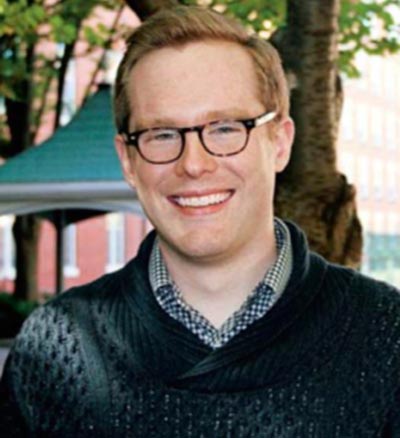Title: Mitchell Scholar to Study Historical Memory in Ireland
Georgetown alumnus Peter Prindiville (SFS’14) becomes one of only 12 Americans to receive this year’s prestigious George J. Mitchell Scholarship.

Georgetown alumnus Peter Prindiville (SFS’14) is one of only 12 Americans to receive this year’s George J. Mitchell Scholarship, which he will use to study how societies assimilate and adapt historical memory.
A native of Woodstock, Illinois, Prindiville studied international history and international affairs at the School of Foreign Service. He will pursue a master’s in history at University College Cork in Ireland with the prestigious scholarship.
Prindiville was selected from nearly 300 applicants for this year’s Mitchell Scholarships, which recognize outstanding academic distinction, leadership and community service. The program seeks to link future American leaders with Ireland.
“I’m interested in exploring how societies remember and talk about the past, and how they inculcate traumatic memories in young people to form a national identity,” says Prindiville, a high school social studies teacher and AmeriCorps volunteer. “I’m especially excited to examine the role of schools in ongoing cultural memory-making and the power of education to sustain or discourage understanding between peoples.”
A Growing Dilemma
The Georgetown alumnus says teaching helped him realize the importance of history education in shaping how societies remember the past.
“I have encountered the real problem of history education – it is inherently political,” he says. “As politics become more polarized, so too do our examinations of the past. In the partisan fray, policy leaders face a formidable dilemma: How do we teach a subject that is divisive?”
Prindiville notes that the team that put together the Common Core standards couldn’t agree on content standards for history after great debate, which he says is an indicator of a growing dilemma.
The issue is not unique to the United States, he adds.
“History curricula and questions of national memory in schools are pressing issues in many other countries, most recently in Japan and South Korea, where government-sponsored efforts to rewrite history curricula have drawn great protest,” Prindiville notes.
“Ultimately, these are questions with which all democracies must wrestle. If we hold that democracy is built on a well-educated citizenry, then the values espoused by the nature and content of that education are of paramount importance. They must be thoughtfully studied and critiqued.”
Teaching Fellow
Prindiville is a teaching fellow with the Alliance for Catholic Education, a program at the University of Notre Dame that trains new teachers while they teach in under-resourced schools.
He will graduate this summer with a master’s degree in education from Notre Dame after teaching for two years at St. Patrick Catholic High School in Biloxi, Mississippi.
The Georgetown alumnus says SFS provided him an important foundation for his work as a teacher and historian.
Rev. David Collins, S.J., associate professor of history at Georgetown, says Prindiville’s selection as a Mitchell scholar comes as no surprise.
“Peter has a great commitment to applying his intellectual gifts, which include a tenacity for figuring things very precisely out, to the political sphere and for the sake of the common good,” says Collins, who taught Prindiville in his religion in the Middle Ages course. “He combines intellectual curiosity and an ability to grasp complicated matters with a capacity to get things done in the complicated arena of politics.”
International Vantage Points
“My experiences in the School of Foreign Service afforded me the opportunity to explore the world from many different academic vantage points,” he says. “That multifaceted approach to inquiry has proven invaluable, especially as I venture to engage international perspectives in my research.”
While in Ireland, Prindiville intends to research the ways historical accounts of the Troubles are presented to students in Ireland, Northern Ireland and the United Kingdom.
“The skills I gained through the honors program in international history also have prepared me very well to undertake this kind of graduate research,” he adds.
Complex Policy Considerations
Prindiville sees his research as highly practical, with direct relationships to contemporary education policy.
While a student at Georgetown, Prindiville was elected to the local District of Columbia commission that represents the Georgetown and Burleith neighborhoods.
“My time in elected office provided important insight into the workings of government, and the possibility for the political process to create and sustain positive good in a community,” Prindiville says.
“Education involves complex policy considerations, just like most local government issues,” he adds. “Innovation in education tends to start in the academic setting, but must interface with policymakers to find systemic success. I hope to work at the intersection of academic and policy work to help reimagine and reinvigorate schooling for the new century.”